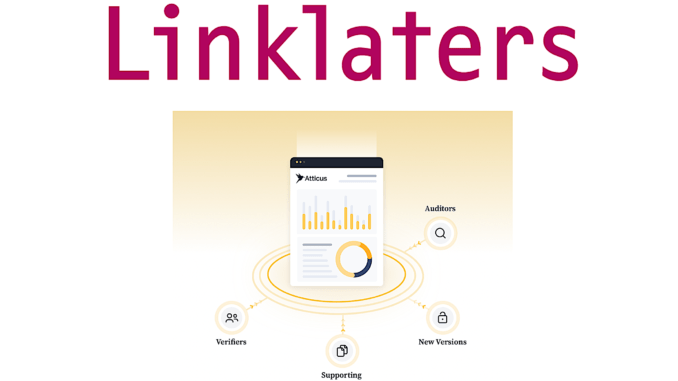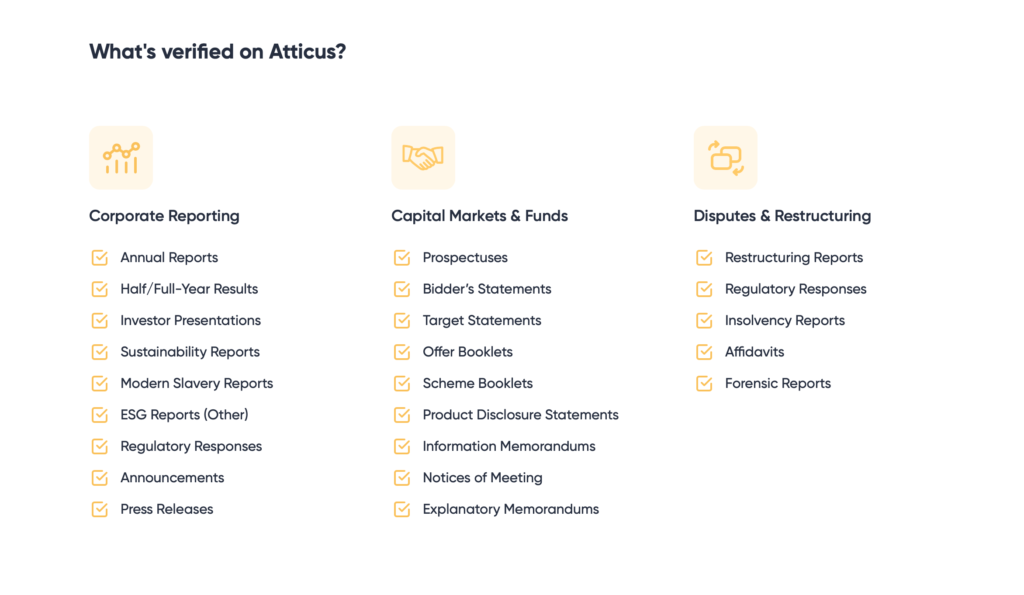
Global law firm, Linklaters, has rolled out the Atticus document verification system across its London and Hong Kong offices. It is also the first major project delivered by Linklaters’ Emerging LegalTech team, which forms part of the Innovation offering at the firm.
Atticus has been developed to increase efficiency and digital collaboration around verifying public documents, such as IPO prospectuses, (see list of use cases below).
The Emerging LegalTech group, which works closely with the Technology function, was created to explore ‘pioneering legal technologies in the market, identify potential technological gaps within the business, enhance collaboration and investigate the future of legal services. The function recently celebrated its one-year anniversary since its inception’ the firm said. And that’s great to see, as experimentation and R&D is essential.
The new group sits within the wider innovation team, which is headed up by Greg Jackson, Head of Strategy, Innovation & Efficiency. Renan Tsoran, Emerging LegalTech lead, is a key part of the group.
Now, back to the tech itself. Public document verification has the same kind of profile as entity management, i.e. it doesn’t sound that Earth-shattering, but in reality is absolutely essential.
For example, if a law firm is working on a stock market listing, the prospectus for the IPO needs to contain plenty of information, from financial data, to claims about the business, to statements about its corporate profile. All this needs to be verified and the law firms involved have to ensure it’s all correct. In the US, for example, suing public companies for allegedly misrepresenting information that affects the share price is a major industry in itself.

However, this process is a major time drain and very complex, as you have lots of documents flying around between parties, and there is also the risk that advisers end up working off a version of the public document that has been changed.
Atticus aims to digitise the process and provide a platform where parties can collaborate easily, keep tight version control of the shared document, and throws in some handy tools to make attributions and references faster to create. In short, it both reduces risk and increases efficiency.
Atticus automates the verification process by creating a workflow where users can easily validate them, reducing inefficiencies and ensuring high levels of accuracy. The platform allows users to upload supporting documents to verify each statement and the generation of verification reports. In addition, Atticus gives all relevant parties on a transaction access to the platform, enabling full real-time collaboration for all those involved.
It’s also the kind of tool you’d probably need to be a deal lawyer to come up with. And that is the case here. Atticus was founded in Australia by Mitchell Brunton, and brothers, Saul and Misha Wakerman in 2017. Saul is an ex-lawyer who worked on various M&A transactions and became frustrated with the standard process for verification. Misha and Mitchell are programmers who, after previously working together at Silicon Valley-based Palantir Technologies, teamed up with Saul to develop the software.
Extensive user testing took place via the law firm’s Practice Innovation & Efficiency teams and other lawyers in London and Hong Kong, led by the firm’s specialist Innovation Lawyers Greg Baker and Hannah Atkinson, while John Lane, a corporate partner in London, is overseeing the roll out of the platform.
Baker commented: ‘Atticus has transformed the verification process in our equities practice. Already, we are seeing significant efficiencies with positive feedback from clients. It is the latest example of how the firm is investing in technology to add value in how we deliver legal advice for clients and alleviating the pain points for our teams.’
Saul Wakerman, co-founder at Atticus, added: ‘We’re pleased to be working closely with Linklaters to streamline their verification processes globally. Atticus is a powerful tool that drives efficiency and accuracy in the verification of public disclosures, including prospectuses, investor presentations, and annual reports. We’ve been impressed with the Linklaters teams’ pace of adoption and their eagerness to rethink processes using new technologies.’
Is this a big deal? As mentioned, public document verification is in the same kind of realm as entity management. It’s probably not why ambitious young lawyers enter the profession, but it’s nonetheless essential – and also the kind of work some associates will be sinking a lot of their time into.
Atticus is one of those legal tech tools that just helps to shave away some of the inefficiency of old, manual processes, saving the firm time to focus on more interesting work, and helping the clients as well.
One might say it’s more about the ‘plumbing’ of legal work, and when used at scale, e.g. across key offices of a global law firm, it makes a difference.
P.S. Atticus, which is based in Melbourne, Australia, has also been part of Allen & Overy’s 2021 Fuse cohort.